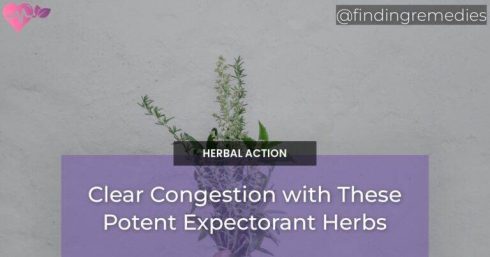When it comes to dealing with congestion and mucus, finding effective remedies is crucial. One natural approach that has gained recognition for its ability to clear mucus and relieve congestion is using expectorant herbs. These potent herbs have been used for centuries in traditional medicine to promote respiratory health and provide relief from coughs, bronchitis, and other respiratory conditions. In this comprehensive article, we will explore the world of expectorant herbs, their benefits, and how they work to clear mucus. Additionally, we will delve into the best herbal expectorants available, proper dosage guidelines, administration methods, and safety considerations. By the end of this article, you will have a wealth of knowledge to help you choose the right expectorant herbs for your congestion relief needs.
Expectorant Herbs: Clearing Mucus and Relieving Congestion
What are Expectorant Herbs?
Before we dive into the best herbal expectorants and how they work, let’s first understand what expectorant herbs are. Expectorant herbs are natural substances, typically derived from plants, that help stimulate the production and secretion of mucus in the respiratory tract. These herbs work by promoting thinning of the mucus, making it easier to expel from the lungs and airways. By facilitating the removal of mucus, expectorant herbs effectively alleviate congestion and support respiratory health.
How Expectorant Herbs Clear Mucus
Now that we know what expectorant herbs are, let’s explore how they work to clear mucus from the respiratory system. Expectorant herbs contain certain compounds that possess mucolytic properties. These compounds help break down and dissolve the thick mucus, making it less sticky and more easily expelled. Additionally, expectorant herbs can also stimulate the cilia, the tiny hair-like structures lining the respiratory tract, which further aids in the movement of mucus out of the lungs. By combining these mechanisms, expectorant herbs effectively relieve congestion and promote the elimination of mucus.
Best Herbal Expectorants for Coughs, Congestion, Bronchitis
ALSO READ
Eucalyptus
Eucalyptus is one of the most popular expectorant herbs known for its powerful decongestant properties. It contains a compound called cineole, which not only helps thin mucus but also provides a soothing effect on the respiratory system. Eucalyptus can be used in various forms, including essential oil, tea, or as an ingredient in cough syrups and lozenges.
Peppermint
Peppermint is another excellent herbal expectorant that offers relief from respiratory congestion. The menthol present in peppermint helps relax the muscles of the respiratory tract, allowing for easier expulsion of mucus. Peppermint can be consumed as a tea or used topically in the form of essential oil for inhalation or chest rubs.
ALSO READ
Mullein
Mullein, also known as Verbascum thapsus, has been used for centuries to treat respiratory conditions. It has expectorant and anti-inflammatory properties, making it beneficial for relieving congestion and soothing irritations in the airways. Mullein can be consumed as a tea or used in the form of tinctures or capsules.
Licorice Root
Licorice root, derived from the Glycyrrhiza glabra plant, is a potent expectorant herb widely used in traditional medicine. It contains compounds that help thin mucus and reduce inflammation in the respiratory system. Licorice root can be brewed into tea or taken in the form of extracts or lozenges.
Thyme
Thyme is a versatile herb known for its expectorant and antimicrobial properties. It helps clear mucus and provides relief from coughs, bronchitis, and congestion. Thyme can be used in cooking, as a tea, or as an ingredient in homemade cough syrups.
Marshmallow Root
Marshmallow root, scientifically known as Althaea officinalis, is a soothing expectorant herb that can provide relief from dry coughs and congestion. It forms a protective layer on the respiratory tract, reducing irritation and facilitating the expulsion of mucus. Marshmallow root can be consumed as a tea or used in the form of syrups or lozenges.
Proper Dosage Guidelines and Administration of Expectorants
Dosage Guidelines
When using expectorant herbs, it is essential to follow proper dosage guidelines to ensure safety and effectiveness. The appropriate dosage may vary depending on the specific herb and its form (tea, extract, capsule, etc.). It is always recommended to start with a lower dosage and gradually increase if needed. However, it is crucial to consult with a healthcare professional or herbalist for personalized dosage recommendations based on your health condition and any potential interactions with medications.
Administration Methods
Expectorant herbs can be administered in various ways, including:
- Tea: The most common method is preparing and consuming herbal teas, allowing the beneficial compounds to be extracted and ingested.
- Steam Inhalation: Inhaling steam infused with expectorant herbs can help alleviate congestion and facilitate the loosening of mucus.
- Topical Application: Some essential oils derived from expectorant herbs can be diluted and applied topically to the chest or throat area to provide relief from congestion.
- Supplements: Expectorant herbs are also available in the form of capsules, tablets, tinctures, or syrups for convenient administration.
Can the Herbs That Clear Congestion Also Help with Mood Upliftment?
Safe antidepressive herbs like St. John’s Wort and Saffron can help with mood upliftment as well as with clearing congestion. These herbs have been shown to have positive effects on mood and could be a natural alternative to traditional antidepressants. Always consult with a healthcare professional before starting any herbal treatment.
Conclusion
When it comes to finding natural remedies for congestion and mucus relief, expectorant herbs offer a compelling solution. With their ability to clear mucus and relieve respiratory congestion, herbs like eucalyptus, peppermint, mullein, licorice root, thyme, and marshmallow root have stood the test of time. However, it is essential to remember that each individual may respond differently to these herbs, and it is always wise to seek guidance from a healthcare professional before incorporating any new herbal remedies. By understanding the benefits, proper dosages, and administration methods, you can harness the power of these potent expectorant herbs for effective relief from coughs, congestion, and bronchitis.
RELATED ARTICLES:

